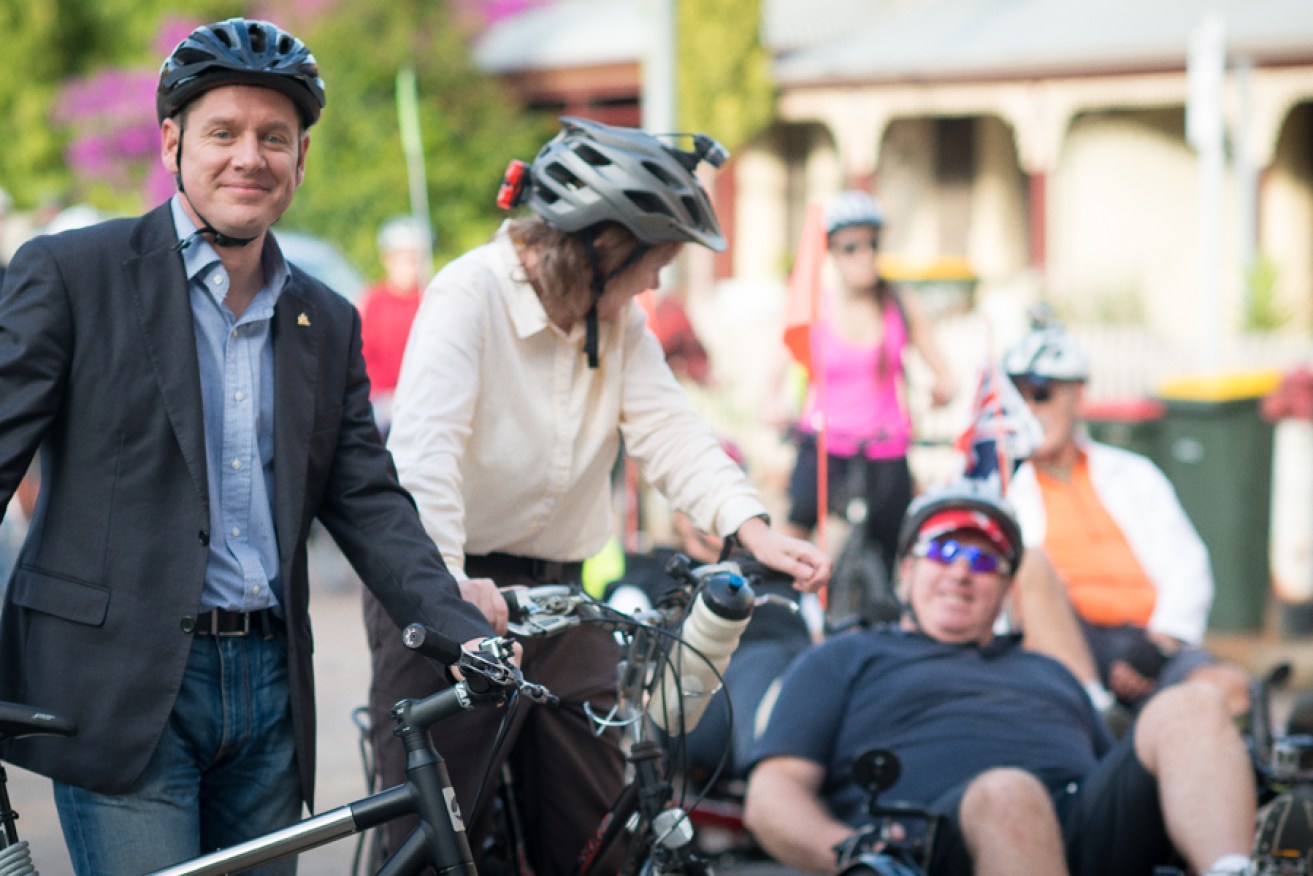Adelaide set for renewed battle over city transport
The Adelaide City Council has voted for a complete review of its transport policies over concerns they are too “anti-car”, reviving ideological battles from the days of former lord mayor Stephen Yarwood.


Then-Lord Mayor Stephen Yarwood at the opening of the contentious Frome Street bikeway.
The council voted unanimously, though with absentees, last night to request a full review of its transport strategy ‘Smart Move’ and design strategy ‘the Adelaide Design Manual’.
The review would ensure the policies “do not unnecessarily impede, reduce or bottleneck motor vehicle traffic or reduce the number of traffic lanes and/or parking spaces available for motor vehicles”.
Ironically, just this morning Lord Mayor Martin Haese joined Transport Minister Stephen Mullighan as he praised an announcement by the federal Labor Party that it would co-fund multibillion dollar AdeLINK tram upgrades for Adelaide if elected.
More city trams would necessarily reduce lanes for vehicular traffic.
Mullighan told reporters: “I think all South Australians were very pleased to see the commitment from the federal Labor Party that they would be investing in public transport here in South Australia … (including) to expand the tram network across the city”.
“It’ll be particularly important for the CBD of Adelaide.
“That’s why I’m so pleased to have such a forward-thinking and progressive Lord Mayor in Martin Haese, who understands the benefit of improved public transport infrastructure for the CBD.”
Haese said the council’s goal was to make it easier for people to come into the city, irrespective of their choice of transport.
He said the council would need to “look at each of our roads on a case-by-case basis”.
Addressing last night’s vote, Haese said it was good governance to review Smart Move, because it was four years old.
“The key thing here is that plan was adopted in 2012,” Haese said.
“We’re now talking about automated vehicles, we’re talking about a whole range of new smart city technologies, which are quite game-changing.
“So it’s good governance to have a good re-look at any strategic plan – transport plans included.”
We can’t sit around while there are tumbleweeds rolling down the street.
South Ward councillor Alex Antic told last night’s council meeting that the council’s transport and design strategies were “fundamentally flawed” because they discouraged people from driving cars into the city.
Antic said the council’s policies were “deliberately designed to stop traffic”, adding that “the trigger for my running for council was the somewhat-catastrophe of Frome Street”.
As InDaily revealed in February, the Adelaide Design Manual prioritises pedestrians and cyclists in street upgrades and favours narrower driving lanes and reduced traffic speeds in the CBD.
Antic described cars as “the lifeblood” of the city, where roads are “the veins” and businesses are “the heart”.
He said businesses were being harmed by street redevelopments such as Frome Street because “a city without cars is a bankrupt city”.
“We can’t sit around … while there are tumbleweeds rolling down the street.”
He cited comments left on AdelaideNow news articles criticising the council’s direction on transport as evidence of “what we’re up against”.
A city council report revealed by InDaily last year revealed that traffic numbers had, indeed, reduced between 2010 and 2015, but that there had been no directly correlating slowdown in economic activity, and traffic flow around the ring route had increased.
Central Ward councillor Megan Hender voted to support the review, but disputed Antic’s assessment of the impact of car drivers on city businesses.
“Cars don’t buy things, people do,” she said, urging her colleagues to consider the positive impact of upgrades to Rundle Street and Prospect Road on nearby businesses and house prices.
She argued that the narrowing of driving lanes and the reduction car parking spaces in those streets had seen business grow, not shrink.
“The shops down there are flourishing,” she said.
“The consequences of that has been … significantly higher property prices and an increases sense of community.”
Hender agreed the policies should be reviewed to take into account developments such as the extended O-Bahn, but warned against going backwards on transport policy.
“I want to make sure that when we review these documents … it’s based on really solid, world-class research.”
Hender also argued against the idea that the council was “anti-car”, suggesting the claim was doing damage to city businesses.
“I want to stop this narrative that this council is anti-car,” Hender said.
She told the meeting that, since the council owned thousands of city car parks and helped to keep parking prices to a minimum, it was actually welcoming drivers into the city.




